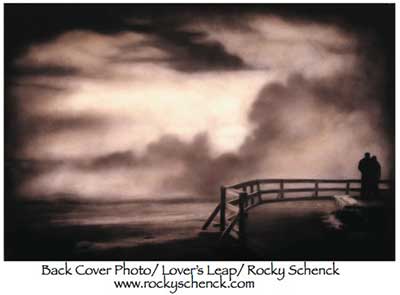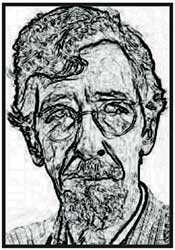Pilgrimage
Volume 30 Issue 2
Borderlands

|
 |
Essays, poems, and stories by Kim Stafford,
Aaron Abeyta, Ana Maria Spagna, Kent
Annan, Nicholas Arons and many other fine
writers and artists
|
|
From In Khumbu by Robert Branscomb
After clambering on the moraines of the Khumbu Glacier, I concluded from my rapidly beating heart that I
needed another day acclimatizing at Lobuche before I attempted the walk to base camp. It was getting late when
I reentered the hut. The old lady was cooking a pot of rice and vegetables over a juniper fire. I sat down opposite
her. We were the only two people in the hut. As my eyes got used to the dim light, I could see that she preferred
not moving around. She had all of her cooking things, reading material, knitting supplies, clothes, and blankets
within reach of her platform by the fire. It even appeared that she slept there. She filled a couple of bowls with
rice and vegetables and handed me one. I was famished, as always, and quickly got to it. As I was stuffing myself,
I happened to look over the rim of my bowl. She was staring at me with the uncanniest look, as if she was looking
inside me. She looked like the wrathful deity Yamantaka I’d seen earlier in the trek on a tanka at Tubting Choling
monastery in Junbesi. I tried to ignore her by ducking back into my bowl. But when I looked back up, there she
was, food untouched, staring at me. So I did the natural thing and with a big smile, opened my mouth, which was
full of food, and stuck my tongue out. She was so tickled she almost fell off her perch into the fire. She spared
me the stare of death for the rest of the evening. Every so often she would look at me and chuckle to herself.
From La Linea by Ana Maria Spagna
... I remember that the bus routes snaked around the new Tijuana convention center, shell-shaped and ultramodern
like the Sidney Opera House, so I waited there often in a shadeless plaza, in the glare of the sun, the hazy orb omnipresent
and merciless. Melancholy. I mainly remember melancholy.
The problem was not what you’d expect, not what it ought to have been, or not entirely so. Not just the cardboard
shacks along the river bottom that would be flooded every year by nature or intent. Not just the long-lashed toddlers in
the orphanages or the maimed beggars in the storefronts, but the whole of it: the insensibly loud city, the silent, proud
abuelas on the bus, stockings rolled to the ankles; the cat-calling chicos on the streets, the gaudy tourist booths and the
gaudy tourists themselves; the trash-strewn outskirts; and the upper-class neighborhoods surrounded by stucco walls
with broken glass embedded atop them and bougainvilleas draped over them—places that seemed both far too elegant
and far too shabby for what they were. I was sad for all the wrong reasons. But I am getting ahead of myself. |

Words Along the Way from Jim Corbett (featured in this issue)
. . . Human salvation isn’t about escape to Heaven, nor is it about saving oneself or even
about the healing of a fractured humanity—except derivatively. Fundamentally, salvation is
about hallowing a way of living on earth that ends the exile of the Divine Presence.
. . . When we cease to work at taming the Creation and learn to accept life as a gift, a way
opens for us to become active participants in an ancient exodus out of idolatry—a pilgrimage that continues to be conceived in wilderness.
|
